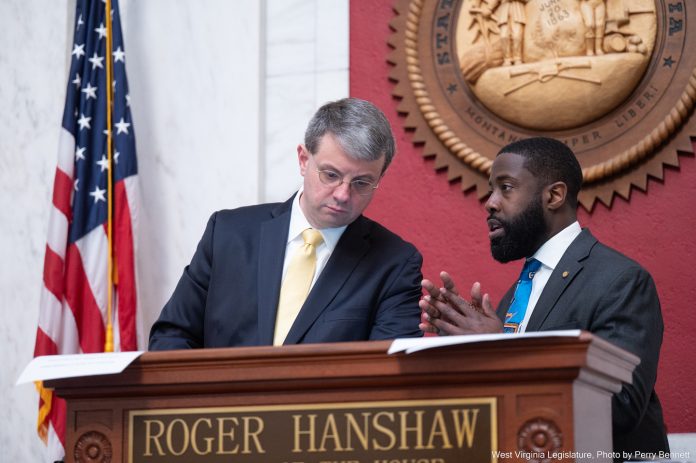House Bill 2002 creates a one-stop shop for permits relating to construction, economic development, infrastructure, and natural resources.
House Bill 2003 prohibits students from having cell phones in the classroom and requires the state board of education to create rules to implement the prohibition. Exceptions are made for students who need cell phones for ADA, IEPS, or any medical needs. The state board will set guidelines for counties as a baseline for their cell phone policies.
House Bill 2008 moves the Department of Economic Development under the Department of Commerce as a division. The current cabinet-level Secretary of the Department of Economic Development position would become Executive Director, which is beneath the Cabinet Secretary of Commerce.
House Bill 2009 eliminates the Department of Arts, Culture, and History and transfers its divisions, boards, and agencies to the Department of Tourism.
House Bill 2011 authorizes the Department of Human Services for Medical Services to spend $223,000,000 of special revenue.
House Bill 2013 states that as of July 1, 2025, all new hires within the Bureau of Senior Services and the Departments of Administration, Environmental Protection, Revenue, and Veterans’ Assistance, as well as any employee within those governmental entities that leaves his or her position, will be exempt from the classified civil service system and the state grievance procedures. The bill states the chief administrative officer of these governmental units shall have the authority to designate certain employees’ status under the classified civil service system and grievance procedures as necessary to comply with federal law, federal regulation, or the requirements for receipt of federal funding or assistance.
House Bill 2014 creates a Certified Microgrid Program in the Division of Economic Development to attract high-impact data centers to the state and localized power generation for microgrids. The amendment alters how the taxes collected would be distributed:
- 50 percent to the Personal Income Tax Reduction Fund
- 30 percent of the county where the Data Center is located
- 10 percent to all counties on a per capita basis
- 5 percent to the Economic Enhancement Grant Fund administered by the Water Development Authority
- 5 percent to the Electric Grid Stabilization and Security Fund
House Bill 2024 updates terms used in the West Virginia Personal Income Tax Act to match federal terms.
House Bill 2025 updates terms used in the Corporation Net Income Tax Act to match federal terms.
House Bill 2026, Budget Bill, allocates money collected to various state entities. The 2026 budget has a general revenue of $5,317,557,000 with a surplus of $210,250,000. The State Road Fund is $2,129,082,658, while “Other Funds” (special revenue) total $2,315,143,753. The Lottery Revenue Fund is $157,392,000, with a surplus of $16,750,000. The Excess Lottery Revenue is $335,008,512, with a surplus of $21,345,488. The expected Federal Funds total is $8,224,744,008, with Federal Block Grants totaling $730,395,275. A $12,000,000 special revenue appropriation was made for various projects.
House Bill 2042 allows for a guardian ad litem to request a court-appointed special advocate for children in abuse and neglect cases.
House Bill 2043 permits the use of drones to track mortally wounded wildlife. The bill also limits dog handlers to one dog when tracking. Anyone using a dog or a drone not on their property must be licensed. Drones cannot be used on other properties without permission from the property owner.
House Bill 2053 adds U.S. Space Force to the definition of armed forces.
House Bill 2054 amends the code relating to the licensing, sale, and service of alcoholic beverages. The bill removes the cap on liquor samples provided at private fairs and festivals. The bill eliminates the requirement that all vendors agree to be jointly and severally liable for liability arising from a license to serve alcohol at private farmers’ markets or private food courts. The bill permits persons who have dined in an establishment to order and carry out a sealed craft cocktail or wine growler. The bill adds new special permits for some PODAs.
House Bill 2066 creates a felony offense for damaging, destroying, or stealing equipment first responders use in their duties.
House Bill 2067 aims to prevent firearms sellers and manufacturers from being subject to liability in a manner that contravenes the purpose of the PLCAA. To bring a negligent marketing claim against a manufacturer or seller, all the following conditions would have to be met:
- The marketing practice directly targeted individuals who are legally prohibited from owning firearms.
- The marketing practice encouraged or facilitated the unlawful use of firearms.
- There is a direct and substantial proximate cause between the marketing practice and the plaintiff’s harm.
- The marketing practice violated a state or federal statute explicitly regulating the sale or marketing of firearms or ammunition in a manner that constitutes a willful and knowing violation of the law.
House Bill 2120 requires an Ethic Commission member to recuse themselves from any decision involving a candidate or campaign to which they made a financial contribution. The bill also requires the commission to develop and create an electronic lobbyist registration and reporting system available for public use on its website. The bill increases the number of reports lobbyists must file with the commission each year and requires grassroots campaigns to report advertising by outlet for expenditures of $5,000 or more.
House Bill 2121 authorizes disabled veterans’ widows to receive the absolute property tax exemption as long as they remain living on the property and remain unmarried.

